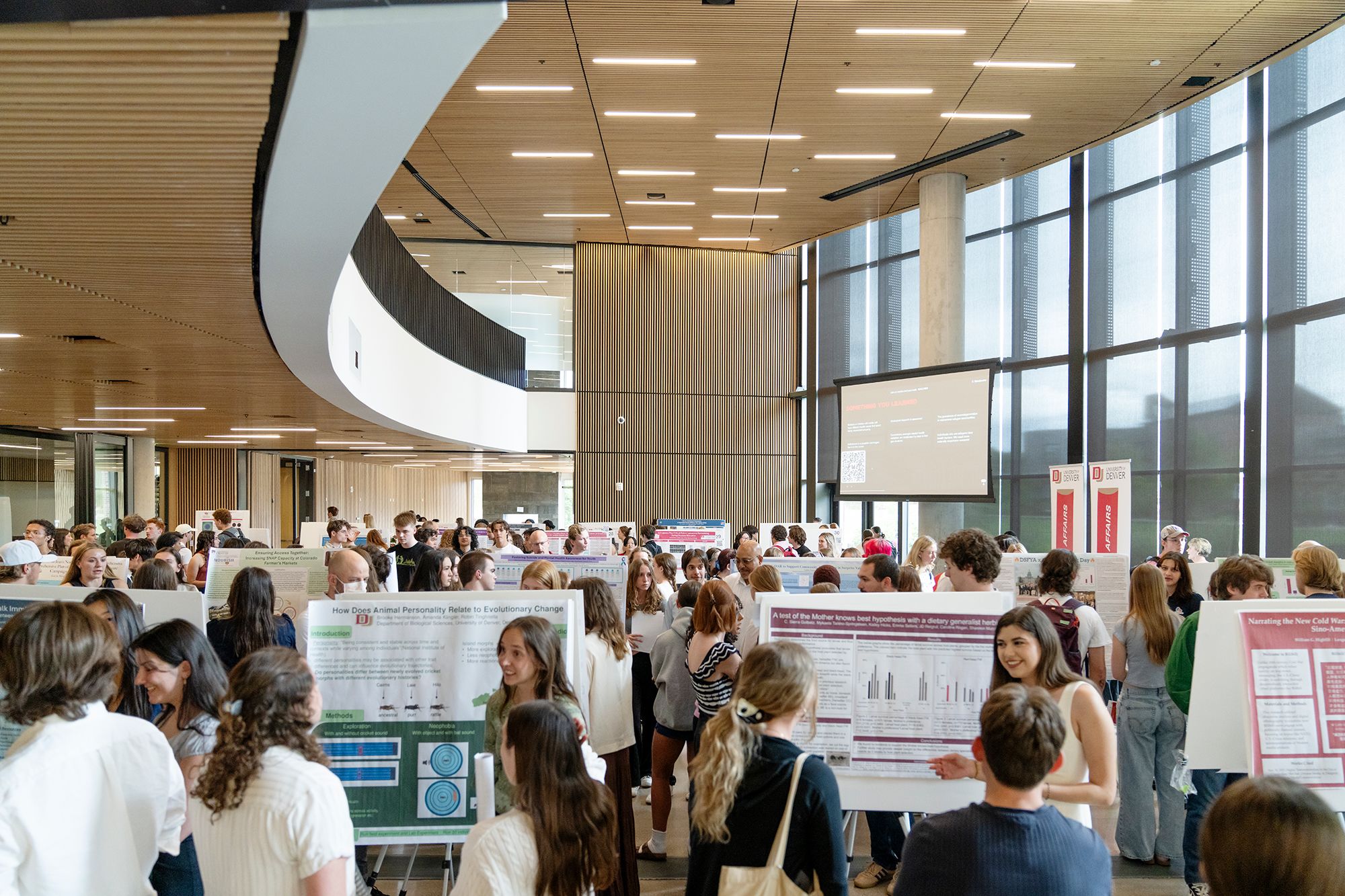5 Student Projects Making a Difference in Denver
At this year’s Signature Work Showcase, students showed how their research is empowering youth and communities across the Mile High City.

One of DU’s points of pride is the access it gives undergraduate students to research opportunities. Thanks to the University’s teacher-scholar model, professors are deeply invested not only in teaching but also in providing students with hands-on experience in the research process.
That commitment was on full display this past May, when 100 students presented their work at the annual Student Signature Work Showcase—standing proudly beside posters and explaining their process and findings to the public.
A theme that emerged from this year’s showcase was local impact, driven by students in DU’s Leadership Studies program. These students presented findings from their year-long Community Change Initiative, which paired them with local organizations to tackle issues in the Denver metro area that they’re passionate about.
“Students are reaching out, doing cold calls, connecting with community members, nonprofit leaders and government leaders, and finding ways that they can collaborate and come up with a with a joint solution,” says Paul Kosempel, a teaching professor and director of leadership studies.
Students may feel overwhelmed at the scope and ambiguity of a large research project at first, but they rise to the occasion and demonstrate impressive growth during the eight months it takes to complete.
“It's very daunting. It's this huge project that you do for an entire year,” says Lizzie Lesoing, a rising junior in the program. “And that's scary, honestly. But the way that [professors] were able to split it up and make it more manageable was awesome.”
The showcase buzzed with energy and noise as student presenters shared their work with friends, parents, mentors, and the wider DU community.
“[They] felt a huge sense of pride that they were able to do it,” says Kosempel. “They were able to understand complex community systems and create an initiative that was really powerful.”
Here are five Community Change Initiative projects that are making waves in Denver.
Increasing SNAP Capacity at Colorado Farmer's Markets
Students asked, “How can we fill the gap between farmers seeking to accept SNAP at farmers markets and ensure they have both the necessary training and sufficient devices to do so?” They answered that question by designing a modified training curriculum for farmers on Supplemental Nutrition Assistance Program (SNAP) certification and usage, hosting a workshop, and using grant funding to supply transaction devices. The students hope to increase training capacity and the number SNAP certifications obtained, and gather participant feedback on the curriculum guide for future use.
Participants: Juliana Ramirez, Casey Doherty, Ella Kestner, Teagan Weindel, Cate Billings, and Pablo Torre-Walte
Project Lead the Way
Students addressed a lack of leadership and soft-skill education in local K-12 schools by designing and teaching weekly classes on these topics at Venture Academy of Leadership and Entrepreneurship in the town of Parker and Douglas County High School in Castle Rock. To measure results, they conducted a pre- and post-survey with the 30 participating students to assess their confidence and ability to exude leadership skills both in traditional and non-traditional leadership roles.
“The best thing from all of our [research] is looking at the results,” says Gabriella Pappas, a student researcher on the project. “It gave this overwhelming idea that our students were more confident not only in themselves and in their leadership skills but also in their concept of leadership.”
Participants: Jagger Livengood, Owen Mantelli, Gabby Pappas, Abby McDonald, Madeleine Dierking, and Eve Miller
Youth Suicide Prevention Community Change Initiative Project
Students asked, “How can youth identify signs of mental health decline, support friends in need, and properly address the topic of suicide within their community?” To answer that critical question, they met with mental health organizations in the Denver area such as Wellpower and the Second Wind Fund to gain a better understanding of community needs surrounding suicide prevention.
Then, students were trained in the American Foundation for Suicide Prevention's "It's Real" curriculum and presented that curriculum to high school students in and around Denver. Their goal was to foster an environment where youth understand how to properly address mental health issues and know where to locate resources for themselves and their peers.
Participants: Courtney Cassidy, Sage Krzyzkowski, Maddox Jones, Skylar Abookire, Luke Hawkins, and Sunnah Yoon
Youth Tackle Capitol Lobbying
Students asked, “How can we empower high school students across Colorado to advocate for themselves and their peers in the political and public policy realms?” To answer, they organized a lobbying day at the Colorado State Capitol for Colorado Youth Congress members. They encouraged students to use their voice, training them on how to lobby in person, contact their elected officials, and make meaningful political and public policy change.
“We saw from being in college that our generation really cares about all these civic issues, but we don't really know how to have our voices heard,” says Lesoing, a Leadership Studies student, “so we wanted to bridge that gap.”
Participants: Anna Respet, Lizzie Lesoing, Sydney Hertel, Aya Saad-Masri, Brooke Ballenger, and Max Proske
Water Inequity: Trust Building Between Communities and Government Entities
Students asked, “How have historical instances of environmental injustice in marginalized communities led to a lack of trust in government solutions to water inequity?” Using interviews with a wide variety of stakeholders, students gained perspective on the nature of water inequity and the compounding social, legal, and environmental factors that affect public health.
Students partnered with Denver Water to come up with various ways to build relational trust between community organizations and government agencies. This included working with Denver Water's Lead Reduction Campaign to help expand its network of community partners. Students say relational trust is crucial in solving decades of infrastructural issues in low-income and predominantly immigrant areas of Denver and will, in turn, solve the public health issues that stem from water inequity.
Participants: Michela Schenk, Maren Lynch, and Madi Hamm



